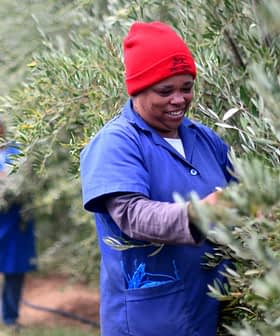
South Africa’s olive oil industry is relatively young compared to European countries that have been producing olive oil for hundreds of years. Despite the late entry however, South African olive oils compare favorably with some of the best in the world with several local producers recently taking top honors at international olive oil competitions.
As these olive oils continue to attract the attention they deserve abroad, the paradox for South Africa remains that the local demand is dominated by imports (80% of all olive oil consumed is imported). In an international industry fraught with cheap and imitation oils that have been mislabeled and even subjected to chemical manipulation, there are significant implications for the South African consumer where the local market is entirely self-regulated.
SA Olive (SAO), the voluntary association representing the country’s olive industry, initiated a comprehensive market research study to test and compare the quality of local vs. imported extra-virgin olive oils. The main purpose of the study, which was conducted in 2011, was to inform the public about the true quality of available olive oils in South Africa.
Using parameters and technology developed by the International Olive Council (IOC), the study revealed that none of the local oils showed any sign of being substandard, whereas 26 percent of imported oils were falsely labeled as extra virgin. Several importers were exposed for passing off inferior olive oils as virgin.
The quality testing of olive oil is especially relevant as there are no regulations or legislation currently governing olive oil imports into South Africa. It is therefore important that consumers can distinguish the quality between the varieties and brands of olive oil on offer.
The Commitment To Compliance (CTC) scheme, an initiative from SA Olive, was developed to aid consumers with this decision. The CTC seal of approval indicates that the oil is 100 percent South African and that the producer is committed to truthful labelling and complies with the standards of the SA Olive Codes of Practice, which are based on international quality standards. The seal also displays the year of harvest which indicates the freshness of the oil.
Another misguided facet of the current olive oil industry in South Africa concerns that of price. There is a common perception among consumers that top-end olive oils often fetch top-end prices. However, the study by SA Olive proved otherwise. It showed that the average price of all olive oils tested was R62.68 ($7.66) for 500ml. The average price for those oils which can be truthfully classified as extra-virgin was R65.19 ($7.96), for the same volume. This is a small difference to pay for some of the best olive oils in the world.
One area where price does become a matter of concern for South African farmers and producers relates to the cost of imported olive oils. European farmers receive millions of Euros each year in order to subsidise their prices and keep the industry competitive in export markets. The result is that imported oils, such as those from Italy or Spain, often carry higher margins than locally produced olive oils which do not benefit from any subsidies.
In the absence of regulations to control both the price and quality of imports, the study by SA Olive emphasizes the importance of informing the consumer about the benefits of choosing local olive oils.
From harvesting to production, the labour-intensive nature of the industry guarantees employment opportunities for thousands of South Africans every year. Another advantage South African producers have is latitude. They press their oils in the European off-season, when oil is scarce and northern demand for ‘fresh-from-the-mill flavor’ is high. South Africans should be just as proud of their olive oils as they are of their fine wines. Educating the public is the key to reducing the dependency on imports and ensuring that the potential of this liquid gold is shared with all South Africans.




